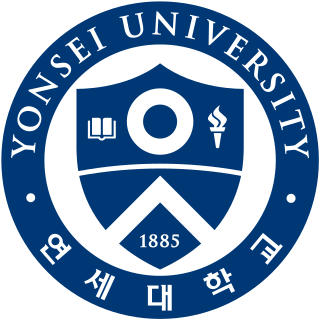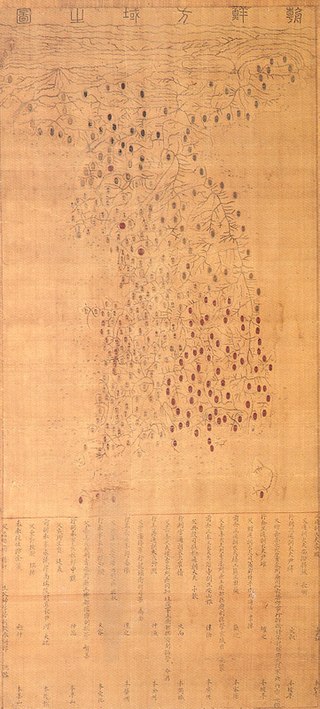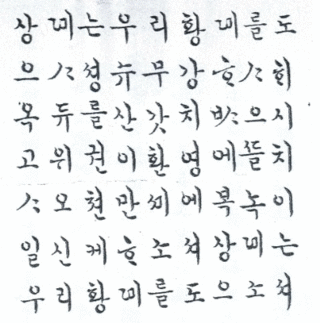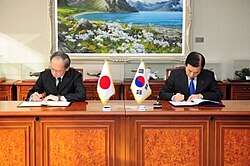
South Korea, officially the Republic of Korea (ROK), is a country in East Asia. It constitutes the southern part of the Korean Peninsula and borders North Korea along the Korean Demilitarized Zone. The country's western border is formed by the Yellow Sea, and its eastern border is defined by the Sea of Japan. South Korea claims to be the sole legitimate government of the entire peninsula and adjacent islands. It has a population of 51.96 million, of which roughly half live in the Seoul Capital Area, the fourth most populous metropolitan area in the world. Other major cities include Incheon, Busan, and Daegu.

The Republic of Korea Armed Forces, also known as the ROK Armed Forces, are the armed forces of South Korea. The ROK Armed Forces is one of the largest and most powerful standing armed forces in the world with a reported personnel strength of 3,600,000 in 2022.

South Korea maintains diplomatic relations with 191 countries. The country has also been a member of the United Nations since 1991, when it became a member state at the same time as North Korea. South Korea has also hosted major international events such as the 1988 Summer Olympics and 2002 World Cup Football Tournament and the 2011 IAAF World Championships Daegu South Korea. Furthermore, South Korea had hosted the 2018 Winter Olympics which took place in Pyeongchang, South Korea from 9 to 25 February.

"Aegukga", often translated as "The Patriotic Song", is the national anthem of the Republic of Korea. It was adopted in 1948, the year the country was founded. Its music was composed in the 1930s and arranged most recently in 2018; its lyrics date back to the 1890s. The lyrics of "Aegukga" were originally set to the music of the Scottish song "Auld Lang Syne" before Ahn Eak-tai composed a unique melody specifically for it in 1936. Before the founding of South Korea, the song, set to the music of "Auld Lang Syne", was sung, as well when Korea was under Japanese rule by dissidents. The version set to the melody composed by Ahn Eak-tai was adopted as the national anthem of the Korean exile government, which existed during Korea's occupation by Japan from the early 1910s to the mid-1940s.


There have a number of significant disputes between various Koreanic and Japonic states. The two regions have a long history of relations as immediate neighbors that has been marked with conflict. One of the most significant issues is the Japanese colonization of Korea that began with the Japan–Korea Treaty of 1910 and ended with the surrender of Japan at the end of World War II.

From 1910 to 1945, Korea was ruled as a part of the Empire of Japan under the name of Chōsen (朝鮮).

The Treaty on Basic Relations Between Japan and the Republic of Korea was signed on June 22, 1965. It established basic diplomatic relations between Japan and South Korea.

Yonsei University is a private research university in Seoul, South Korea. As a member of the "SKY" universities, Yonsei University is deemed one of the three most prestigious institutions in the country.

Relations between the Russian Federation and Japan are the continuation of the relationship of Japan with the Soviet Union from 1917 to 1991, and with the Russian Empire from 1855 to 1917. Historically, the two countries had cordial relations until a clash of territorial ambitions in the Manchuria region of northeastern China led to the Russo–Japanese War in 1904, ending in a Japanese victory which contributed to the weakening of the monarchy in Russia. Japan would later intervene in the Russian Civil War from 1918 until 1922, sending troops to the Russian Far East and Siberia. That was followed by border conflicts between the new Soviet Union and the Empire of Japan throughout the 1930s. The two countries signed a nonaggression pact in 1941, although the Soviet government declared war on Japan anyway in August 1945, invading the Japanese puppet state of Manchukuo as well as seizing the Kuril chain of islands just north of Japan. The two countries ended their formal state of war with the Soviet–Japanese Joint Declaration of 1956, but as of 2022 have not resolved this territorial dispute over ownership of the Kurils. Due to the 2022 Russian invasion of Ukraine, relations became very tense after Japan imposed sanctions against Russia. Russia placed Japan on a list of "unfriendly countries", along with Taiwan, South Korea, Singapore, the United States, European Union members, NATO members, Canada, Australia, New Zealand, Norway, Switzerland, Micronesia and Ukraine.

For over 15 centuries, the relationship between Japan and Korea was characterized by cultural exchanges, economic trade, political contact and military confrontations, all of which underlie their relations even today. During the ancient era, exchanges of cultures and ideas between Japan and mainland Asia were common through migration via the Korean Peninsula, and diplomatic contact and trade between the two.

This is a timeline of the history of Korea. Some dates prior to the 5th century are speculative or approximate. For era names see Era names in Korean history.

The "Patriotic Hymn of the Great Korean Empire" was the national anthem of the Korean Empire during the 1900s. It was the first and only national anthem of a unified Korean state to date.

Diplomatic relations between South Korea and the United States commenced in 1950, when the United States helped establish the modern state of South Korea, officially the Republic of Korea, and fought on its UN-sponsored side in the Korean War (1950–1953). During the subsequent decades, South Korea experienced tremendous economic, political and military growth.

Anti-Japanese sentiment in Korean society has its roots in historic, cultural, and nationalistic sentiments.

The China–Japan–South Korea trilateral summit is an annual summit meeting held between the People's Republic of China, Japan and South Korea, three major countries in East Asia and the world's second, third and 12th largest economies. The first summit was held during December 2008 in Fukuoka, Japan. The talks are focused on maintaining strong trilateral relations, the regional economy and disaster relief.

Japan–South Korea relations refers to the diplomatic relations between Japan and the Republic of Korea. As both nations are separated by the East Sea and the Korea Strait, Korean-Japanese interactions have existed since ancient times; the southern portion of the Korean Peninsula acted as a closest entryway for Japan to engage in economic trade and cultural exchange to and from mainland Asia. By 1910, Korea would become a colony of Japan until 1945.

Chung Eui-yong is a South Korean diplomat and a politician served as Minister of Foreign Affairs from 2021 to 2022. Chung was previously President Moon Jae-in's first Director of National Security from 2017 to 2020.
Events of 2019 in South Korea.

The Japan–South Korea trade dispute, also known as the Japan–South Korea economic war, was an economic conflict between Japan and South Korea.


















